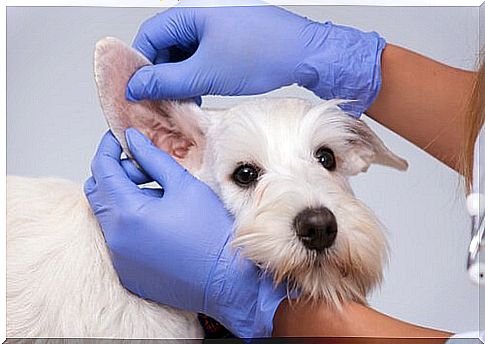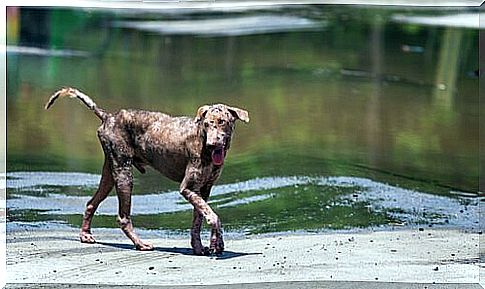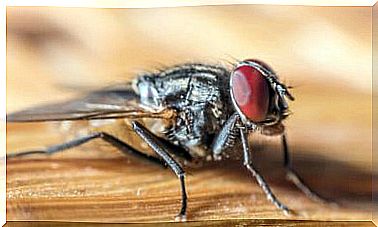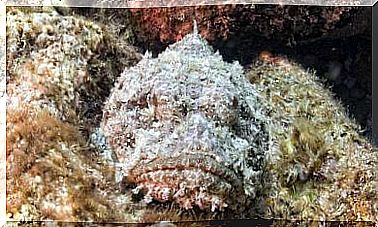Summer Infections In Dogs: Here Are The Most Frequent

Days full of sun and heat are perfect for carrying out various outdoor activities and sports with your four-legged friend. But, with high temperatures, a whole series of summer infections can occur in dogs due to the greater exposure to atmospheric agents.
It is therefore very important to increase hygiene and keep the cleaning routine high on the entire body of the animal. It is the best way to prevent, or limit, the most frequent summer infections in dogs that we will help you to learn more about in the following article.
What are the main summer infections in dogs?
When summer arrives, many owners change their dogs’ routines and increase their exposure to the outdoors. Trips, walks, excursions in the open countryside, swimming in the sea or in the pool, running and rolling in the grass… These are all activities that are repeated continuously.
These outings are the best way to spend time together, as dogs love to move and play next to you. And even better if they can discover new places with their loved ones.
However, it is essential to take some preventative measures, so that all this fun does not pose a risk to their well-being. The outdoors guarantees healthy entertainment, but it also means exposure to various pathogens. Therefore, pet health problems multiply during the hottest season of the year.
In the next few lines, we’ll talk about the three main summer infections in dogs and how to prevent them. We advise you to consult your veterinarian in the presence of any anomaly or change in the behavior or appearance of your four-legged friend.
1. Otitis
Ear infections and inflammation are particularly common in dogs during the summer. Most owners increase the frequency of baths, as their pets tend to get dirty more easily outdoors. In addition, many breeds love to jump into the sea or pool, constantly staying wet.

All this promotes the accumulation of moisture in the ear region and the proliferation of bacteria, fungi and yeasts. These microorganisms can cause inflammation and infections in the external and internal region of the ear canal. For this reason, cases of otitis increase significantly during the summer.
To prevent this annoying and dangerous problem, remember to dry your ears thoroughly after every swim or day spent in the pool. Use dry gauze or a clean cloth for optimal drying.
A good practice is to check your dog’s ears every two to three days to identify any symptoms. In addition, a thorough cleaning every 15 days is also needed to maintain good hygiene in this area.
2. Skin problems
Dog skin is very sensitive and is exposed to numerous risks during the summer. These factors include the intensity of the sun’s rays, the proliferation of ectoparasites, sea salt, pool chemicals, etc.

All of this can encourage the development of sunburn, allergies, inflammation and skin infections that will affect your best friends. Below, we will look at some preventative measures to prevent these conditions from harming your dog’s health :
- Apply sunscreen to avoid sunburn : excessive exposure to sunlight is very dangerous for pets. In addition to causing burns, the chances of skin cancer increase. It should be remembered that sunscreen for people should not be used. In specialized shops you will find products made especially for dogs.
- Avoid the accumulation of moisture : you will have to dry the skin and fur of the dog carefully, to prevent them from remaining damp. The proliferation of bacteria, fungi and yeasts favors the development of skin infections and inflammations. After a day in the pool or on the beach, your pet will need a good drying.
- Deworming: ectoparasites reproduce intensively with the arrival of high temperatures. This increases the likelihood of your dog coming into contact with fleas, ticks, mites and mosquitoes. In addition to causing intense itching and inflammation of the skin, they can transmit serious diseases to the pet. Therefore, it is essential to repeat the deworming with the arrival of summer.
3. Gastrointestinal infections
Changes in temperature, heat, and dietary changes can cause gastrointestinal problems for your pets. To avoid this, you will need to pay particular attention to their diet and always ensure proper hydration to dogs during the summer months.









